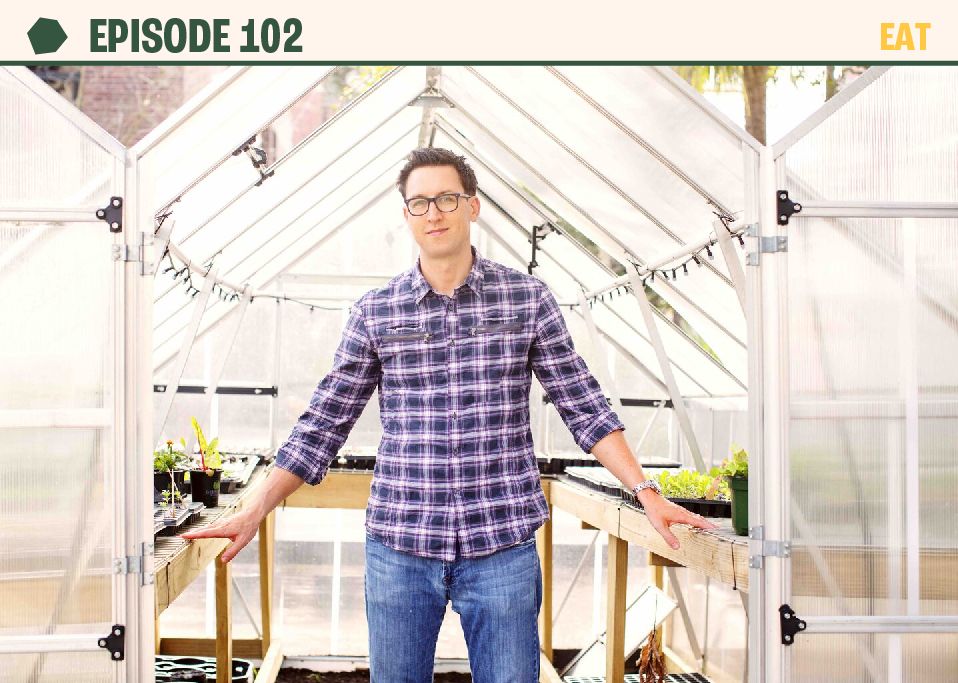In Episode #104, I sat down with environmental researcher Nicholas Carter to chat about how our current food system is affecting the environment. We discussed the changes needed to meet climate goals and create a system that results in better food security, less water pollution, less land use, less freshwater use, and greater production efficiency.
We covered some big questions in this episode, including what climate change is, what the implications of a warming planet are, and whether climate change is more than an energy issue. We also discussed greenhouse gases and their connection to human activity and agriculture before going on to talk about the environmental impact of animal- versus plant-based foods as well as food transportation. Nicholas also shares some top tips that we can implement individually to lower our environmental footprint. There’s so much more in this episode, making it one of my favourite episodes yet.
For more from Nicholas Carter, see Episodes #111, #116, #136, #175, and #230.
The best way to support the show is to use the products and services offered by our sponsors. To check them out, and enjoy great savings, visit theproof.com/friends.
Enjoy, friends.
Simon
Additional resources:
- Poore and Nemecek’s 2018 study looking at the environmental impact of food from almost 40,000 farms across 119 countries
- 2020 Drawdown Review by Paul Hawken and his team (shift to plant-centric diets)
- EAT Lancet report – the planetary health diet (88% or more calories from plants)
- Meat the Future documentary (cellular agriculture – a potentially more sustainable way to produce meat in the future)
- Why buying local is not as important as food source when it comes to the environmental footprint of your food
- The Food Climate Research Network’s Grazed and Confused report – a detailed report on holistic grazing and climate change
- White Oak Pastures
- Why methane matters
- Blog post on climate change and our food system
- Greenhouse gases in the US are significantly underestimated
- Assessing the efficiency of changes in land use for mitigating climate change
- Limited and reversible sequestration from even the best grazing systems
- Value of forests
- Humans have cut down about 46% of the trees on land since the dawn of civilization
- Comparison of ‘Big Livestock’ versus ‘Big Oil’ companies
- If the livestock sector were to continue with business as usual, they would account for 49% of the emissions budget for 1.5°C by 2030
- IPCC: ‘There is no scientific argument for selecting 100 years compared with other choices…The choice of time horizon is a value judgement because it depends on the relative weight assigned to effects at different times.’
- Plant-based farming can feed over 10 billion people
- National Geographic’s article on feeding 9 billion people
- Increasing vegetarian food options shows major increases in it being selected: https://www.pnas.org/content/116/42/20923
- ‘The Climate Crisis Secret’ – comparing greenhouse gases estimates attributed to animal agriculture: https://sentientmedia.org/the-climate-crisis-secret/
- ‘The Secret to Farming for the Climate’ – plant-based farms, myths, and plant-based regenerative farms: https://awellfedworld.org/issues/climate-issues/farming-for-climate/
- ‘Farming for the Planet’ – plants to farm, their benefits, the truth about the need for manure, and general comparisons: https://sentientmedia.org/farming-for-the-planet/
- ‘Local Beef vs. Imported Beans: Which is Better for the Planet’: https://www.planetfriendlynews.com/blog/local-beef-vs-imported-beans-which-is-better-for-the-planet
- ‘Why Agriculture’s Greenhouse Gas Emissions Are Almost Always Underestimated’: https://www.forbes.com/sites/jeffmcmahon/2019/12/02/5-reasons-agricultures-greenhouse-gas-emissions-are-usually-underestimated/ • Curated, peer-reviewed papers on the topic: https://www.plantbaseddata.org/








